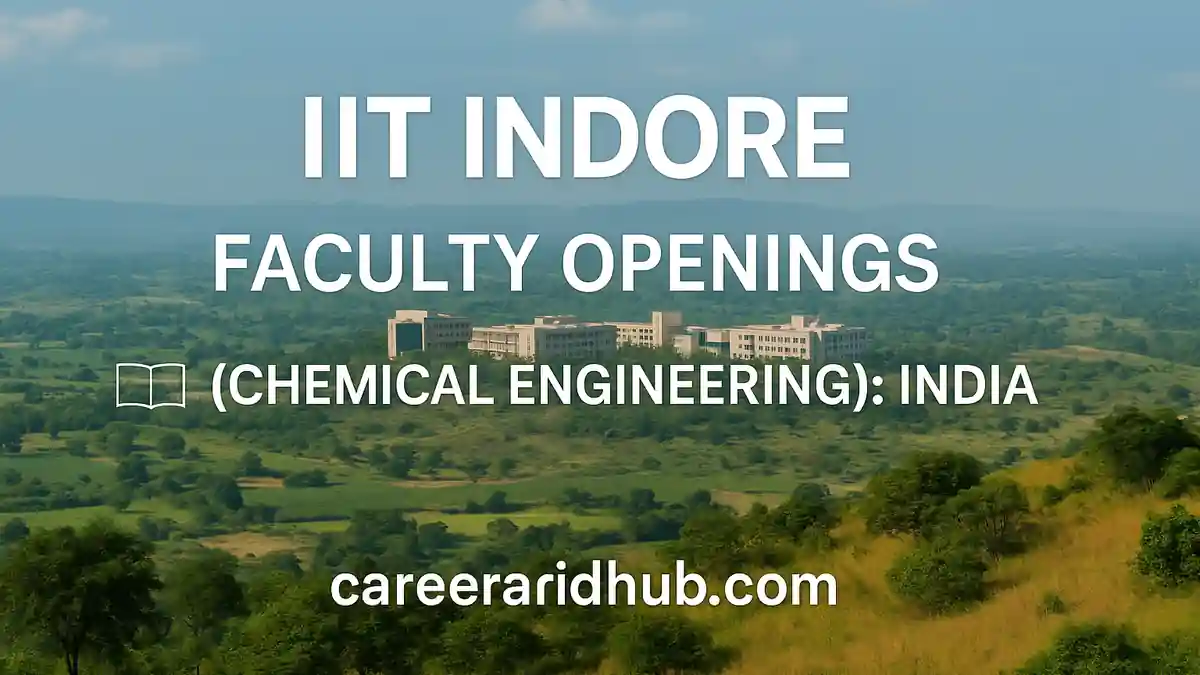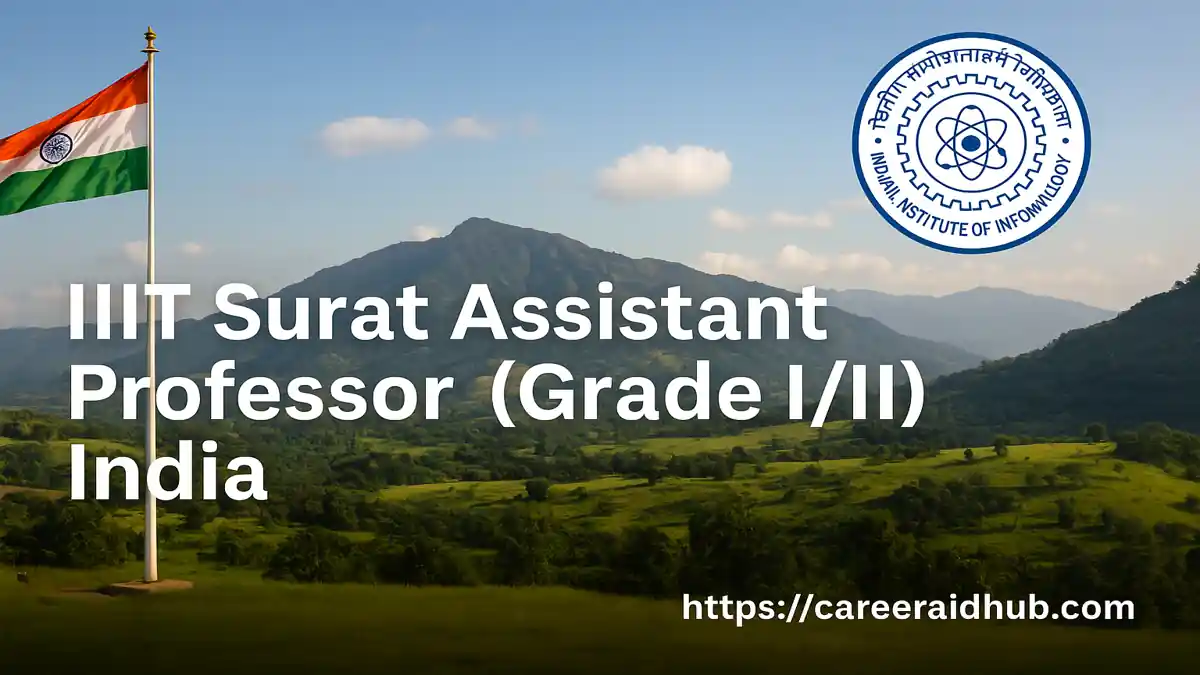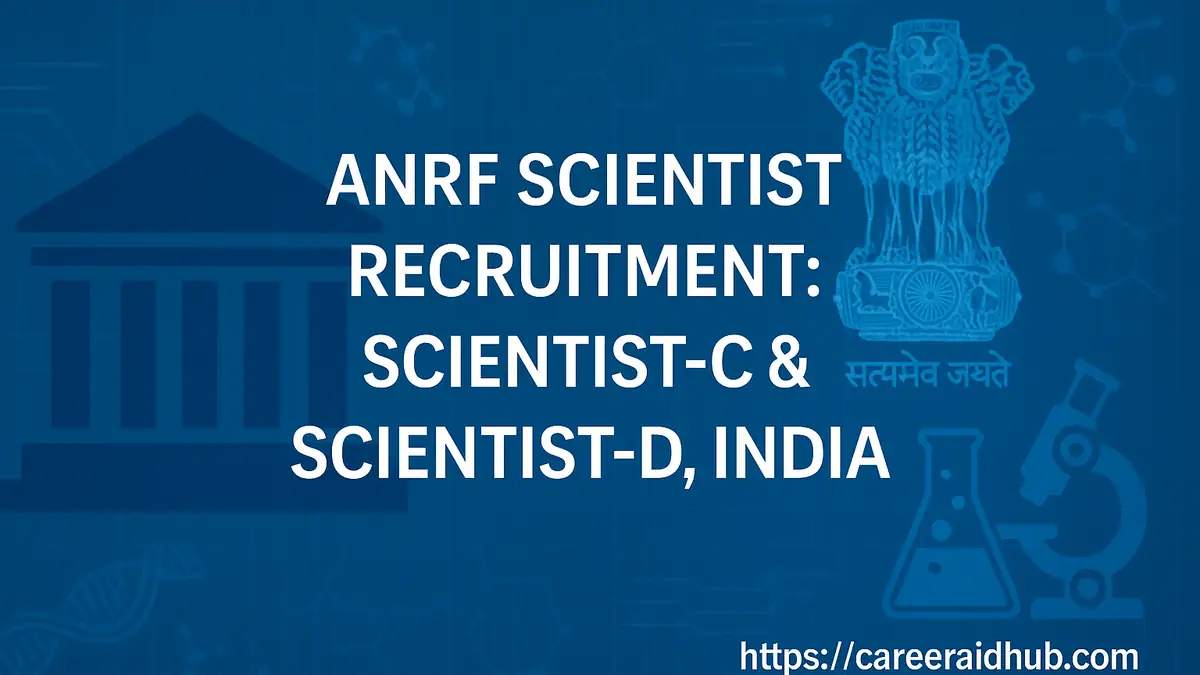The Department of Computational and Data Sciences (CDS) at the Indian Institute of Science (IISc), Bengaluru, has opened a call for full-time, tenure-track faculty appointments at the Assistant Professor level. This recruitment is aimed at scholars whose work sits at the intersection of computation, data, and engineering science, and who can contribute to both foundational research and mission-driven applications. The department is strengthening its capacity in areas such as high-performance computing, large-scale data analytics, trustworthy AI, and computational modeling of complex systems, and therefore welcomes applications from candidates with strong research trajectories, excellent publication records, and an aptitude for interdisciplinary collaboration.
CDS is distinctive in India because it brings together two strands that are often separated in traditional departments—computational science and data science—and insists that faculty be able to navigate between the two. Thus, the present call is not a generic computer science advertisement but a targeted search for faculty who can develop methods, build systems, and demonstrate their relevance through real-world use cases in science, engineering, climate, health, or national missions.
About the CDS Department at IISc
The CDS department is structured as an interdisciplinary engineering department within IISc. It was created to address a growing need: modern scientific
Dual Research Streams
CDS operates broadly through two complementary streams:
(a) Computational Science and Engineering (CSE)
This stream is concerned with the mathematical and algorithmic foundations needed to simulate, optimize, and control complex physical, chemical, biological, and engineered systems. It includes numerical linear algebra, discretization methods for partial differential equations, multiscale and multiphysics simulations, inverse problems, uncertainty quantification, and computational optimization. Faculty in this stream often work closely with researchers in mechanical, aerospace, chemical, materials, earth and climate sciences to turn computational methods into usable scientific tools.
(b) Data Sciences and Scalable Systems
The second stream is focused on the acquisition, management, analysis, and visualization of large and heterogeneous datasets. It covers machine learning and deep learning, data management, graph and network analytics, data mining, large-scale information retrieval, and interactive visualization. A critical aspect here is scale: the department is interested not only in ML models but also in how those models run on distributed, accelerator-rich, or cloud-edge platforms.
Interdisciplinary Positioning
Because CDS is positioned between computer science, applied mathematics, and domain sciences,
Teach core computational/data courses;
Lead a research group with M.Tech. (Computational and Data Science) and Ph.D. students;
Work on funded projects with other IISc labs;
Build prototypes or platforms that may interest industry partners.
The department therefore expects its faculty to be comfortable with method-plus-application research: building the method, implementing it at scale, and demonstrating its utility.
Areas of Specialization Sought
The current call states that CDS is open to all high-quality applications in computational and data sciences that sit at the intersection of methods, systems, and impactful applications. However, for the present cycle, several topical areas are likely to receive special attention because they align with ongoing projects, student demand, and national research priorities.
Computational Mathematics and Its Applications
Advanced numerical methods for PDEs, integral equations, and multiscale phenomena
Scientific and engineering simulations for complex fluids, structures, energy
systems, or climate modelsUncertainty quantification, stochastic modeling, and robust optimization for safety-critical or mission-oriented systems
Computational approaches to materials science, computational biology, geophysics, and environmental systems where large models must be solved repeatedly
This sub-area is well suited for candidates whose doctoral or postdoctoral work combines mathematical rigor with computational implementation on parallel or accelerator-based architectures.
Data Science and Its Applications
Large-scale data analytics, including data assimilation and streaming data
Machine learning for structured, semi-structured, and unstructured data
Statistical learning under constraints such as limited labels, privacy, or fairness
Knowledge extraction, representation learning, and graph-based modeling
Interactive and explainable AI for science and engineering use cases
Platforms and programming models for big data, including distributed ML and federated approaches
Faculty in this area are expected not only to publish in high-quality ML/data venues, but also to demonstrate deployment pathways—for example, through collaborations with climate modelers, biomedical imaging groups, or urban analytics projects.
Scalable Systems for Computation and Data
High-performance
computing for large-scale simulations, including heterogeneous and emerging architecturesDistributed and parallel systems tailored for modern ML workloads
Accelerator-aware runtimes, performance portability, and software-hardware co-design
Edge-to-cloud data pipelines, real-time stream processing, and workflow orchestration
Storage, I/O, and fault-tolerance techniques for data-intensive science
Candidates who can bridge systems and AI/ML or HPC and data analytics will be particularly attractive, because many real CDS problems now require both fast numerics and fast data movement.
Alignment with National and Global Priorities
The department also values applicants who can connect their work to broader priorities such as sustainable and digital infrastructure, secure and resilient cyber-physical systems, AI for science, or computational solutions for healthcare and agriculture. Such alignment helps faculty secure national-level funding and build consortia.
Position Details: Assistant Professor (Tenure-Track)
This announcement is specifically for Assistant Professor positions on tenure track. In IISc’s framework, this usually implies a clear entry pathway and a structured review mechanism.
Nature of Appointment
The appointment is full-time and permanent-track.
The selected candidate will initially join as Assistant Professor.
Performance will be reviewed periodically based on research output, quality of journals/conferences, external grants, teaching effectiveness, and contribution to departmental activities.
Upon meeting IISc’s promotion and confirmation requirements, the faculty member can be placed on tenure/confirmed status and considered for higher grades.
Expectations from New Faculty
Newly appointed faculty in CDS are expected to:
Establish an independent research program with national/international visibility within a reasonable time frame.
Teach core courses at the M.Tech. (CDS) and Ph.D. levels—typically in numerical computing, parallel and distributed computing, data mining and ML, optimization, or systems for data science.
Guide graduate students and build a laboratory or research group.
Pursue sponsored research from national agencies (SERB, MeitY, DST, ISRO, DRDO, DBT) and, where appropriate, from international or industry partners.
Contribute to the department’s outreach and interdisciplinary programs.
Applicants returning from postdoctoral stints abroad or from R&D roles in industry labs may be able to accelerate their progress, especially if they can bring ongoing projects or can quickly set up an experimental/computational facility. IISc has been making efforts to shorten recruitment and onboarding timelines, which is particularly beneficial for candidates relocating to India.
Eligibility and Ideal Candidate Profile
While the institute lays down the formal eligibility, the CDS department typically looks at a broader set of signals to decide on fit.
Academic Requirements
A Ph.D. in a closely relevant field: computational science, computer science, data science, applied mathematics, electrical/mechanical/aerospace engineering with a strong computational or data orientation, or an allied discipline.
A strong publication record in reputed international journals and conferences corresponding to the candidate’s sub-area (for example, SIAM, IEEE TPDS, VLDB, NeurIPS, ICML, KDD, HPDC, IPDPS, EuroPar, SC, domain-specific high-impact journals).
Clear evidence of independent research, such as a well-defined problem space, first-author publications, or substantial contributions in collaborative projects.
Teaching and Curriculum Capability
CDS is a teaching department as well as a research one. Therefore, candidates should be able to:
Teach at least one or two of the department’s core computational/data courses;
Design specialized electives in their niche—such as scientific ML, uncertainty-aware computing, scalable graph analytics, performance engineering, or data systems for AI;
Supervise M.Tech. dissertations and Ph.D. theses;
Contribute to course modernization (for example, moving to GPU/cloud labs, incorporating open datasets, or using reproducible research practices).
Collaborative Mindset
Because CDS collaborates widely inside IISc, the department values candidates who can work across disciplinary boundaries. For instance:
A numerical analyst who can validate methods on real climate or structural engineering problems;
A data scientist who can work with biology or health sciences to extract patterns from high-dimensional data;
A systems researcher who can optimize the institute’s HPC or AI workload.
Applicants with industry or national laboratory experience in scalable AI, large simulations, or scientific software engineering are also encouraged, since these skills help translate research into tools that others can adopt.
Why This CDS Faculty Call Is Important
This particular call is significant for at least three reasons.
Interdisciplinary Leverage
Very few departments in India are structurally built to handle the computational-and-data-science crossover. Many appointments end up either purely in computer science or purely in applied math/mechanics. CDS, on the other hand, is designed to hire people who do both—develop a method and engineer it at scale. For early-career faculty, this means they can publish in a wide spectrum of venues without being told that their work is “too applied” or “too systems.”
National and Strategic Relevance
India’s ongoing national missions—space, defense, climate resilience, digital public infrastructure, health analytics—need researchers who can combine HPC + AI + domain. CDS is one of the few locations where such integrated work can be conducted with access to high-end computing, institutional support, and strong students.
Strong Student Pipeline
CDS already runs successful M.Tech. (Computational and Data Science) and Ph.D. programs. This immediately gives newly hired faculty access to motivated students. Unlike many new departments that take time to build enrolments, CDS is mature and has a consistent applicant pool. This shortens the time it takes to set up a functioning lab.
Research Ecosystem and Visibility
Being at IISc provides access to:
Central computing resources and HPC facilities;
Sponsored research from SERB, MeitY, DST, ISRO, DRDO, DBT;
Joint projects with industry, especially in AI/ML and data platforms;
International recognition channels, as CDS faculty and students routinely appear in premier conferences and fellowships.
This blend of national mission relevance and international visibility makes the call particularly attractive for Indians abroad who want to return without losing research momentum.
How to Apply
The application process is conducted through the CDS faculty opportunities page and follows IISc’s standard format.Documents Typically Required
Curriculum Vitae – with complete academic history, list of publications, projects, and teaching experience.
Research Statement – outlining past work, core research agenda, and a 3–5 year plan indicating how the candidate will build a group, what problems they intend to tackle, and how their work aligns with CDS.
Teaching Statement – listing courses they can teach immediately, courses they can design in future, and pedagogical approaches they prefer (projects, labs, blended learning, open-source toolchains).
List of Referees – at least three referees with complete contact details; referees should be able to comment on the candidate’s research independence.
Sample Publications – up to three representative papers that show depth, originality, and technical quality.
Submission and Communication
Applications and queries should be sent using the contact details provided on the live CDS faculty opportunities page. The department occasionally updates the contact email or the name of the faculty recruitment committee chair, so applicants should always verify the current address before sending materials.
Preparing a Strong Application
To improve the chances of selection:
Tailor the research statement to CDS, not to a generic CS department.
Indicate collaboration possibilities across IISc.
Mention current or planned funded projects.
Show ability to supervise graduate students right away.
If you are applying from overseas, specify an approximate joining window.
When to Apply (Rolling Model and Review Windows)
CDS, like several IISc departments, effectively operates a rolling recruitment model. Strong candidates are welcome to apply at any time. However, the department tends to review applications in clusters so that the faculty selection committee can interview, evaluate, and recommend in a structured way.
Current Cycle: Open now; applications being accepted.
Next Expected Review Window: January (we will update soon).
Subsequent Window: Around July (we will update soon).
Because IISc has been working to shorten hiring timelines, candidates who are about to complete a postdoctoral project or are finishing a major industry assignment are advised to apply a few months in advance of their availability. This ensures that, if shortlisted, they can be called for an interaction or interview within a reasonable time frame.
Conclusion
The call issued by the Department of Computational and Data Sciences at IISc Bengaluru represents a rare opportunity for computational scientists, data scientists, and systems researchers who want to build a long-term academic career in India without compromising on research quality or interdisciplinarity. It offers an established student pipeline, access to modern computing infrastructure, proximity to other top IISc departments, and the stability of a tenure-track pathway. Candidates who can demonstrate strong publications, a clear five-year research vision, the ability to teach core and advanced CDS courses, and a willingness to collaborate across domains will be especially competitive. Interested applicants should consult the official CDS faculty opportunities page, prepare a tailored dossier, and apply at the earliest to be considered in the next review window.
Program Snapshot
| Feature | Details |
|---|---|
| Program Name | Assistant Professor (Tenure-Track), Department of Computational and Data Sciences (CDS), Indian Institute of Science, Bengaluru |
| Host Country / Region | India (Bengaluru, Karnataka) |
| Funded By | Indian Institute of Science (IISc), through regular faculty positions under institute norms |
| Duration | Full-time, tenure-track; confirmation/promotion subject to periodic review |
| Study / Work Mode | Full-time, on-campus, residential/commutable |
| Eligibility | Ph.D. in computational science, data science, computer science, applied mathematics, engineering with strong computational component, or closely related fields |
| Financial Support | Regular IISc faculty pay scales, research initiation grants as per institute policy, access to national/institutional funding, lab setup support |
| Fields of Study / Appointment | Computational science and engineering, numerical computing, data science and AI/ML, scalable and high-performance systems, data platforms, scientific computing with applications |
| Deadline | Rolling; current cycle active; next expected review window: January (we will update soon) and July (we will update soon) |
| Official Website | Opportunities Faculty |
Frequently Asked Questions
IISc CDS is inviting applications for full-time, tenure-track Assistant Professor positions in computational science, data science, and scalable systems.
Applicants must hold a Ph.D. in a relevant computational, data, computer science, applied mathematics, or engineering discipline and show strong research potential.
Yes, CDS follows a rolling recruitment model, but applications are typically reviewed in periodic cycles, so early submission is advisable.
IISc CDS currently prioritizes numerical and scientific computing, large-scale data science, AI/ML, and high-performance or distributed systems for data-intensive workloads.
It is not mandatory, but IISc prefers candidates who can demonstrate independent research, funded projects, or impactful postdoctoral/industry work.
Selected faculty will teach core CDS courses, offer electives in their specialization, and supervise M.Tech. and Ph.D. research students.
Yes, faculty can access IISc start-up support and can apply for national and industry-sponsored projects to build their labs.
Absolutely, CDS encourages applicants who can collaborate across IISc and apply computational or data methods to science, engineering, or health problems.
Candidates must submit a CV, research statement, teaching statement, key publications, and referee details through the CDS faculty opportunities page.
Applicants should revisit the official IISc CDS page every few months to confirm current priorities, contact details, and review timelines.










